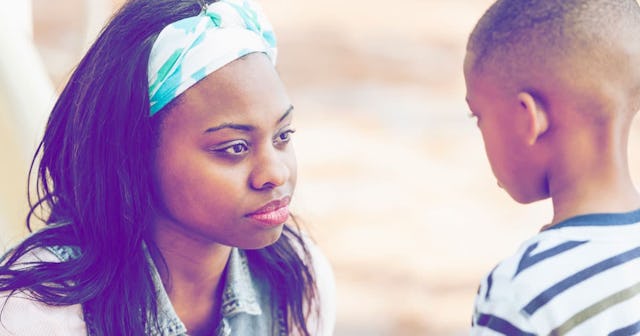What I Realized When My Child Asked, 'Mommy, Do You Still Love Me?'

After misbehaving, one of my five-year-old twins spent a humbling few minutes of alone time last week. For what? At this point, I honestly have no bloody idea. Much like I was as a child, she’s strong-willed, determined, and has a firecracker of a personality, all of this rolled up into one tiny human. Though it may be trying on me from time-to-time, I love that she’s brave enough to go against the grain and question authority, even when that authority just so happens to be her own mother.
While being so small, she’s still learning how to navigate all of these big feelings she experiences, and it’s my job to teach her how to do just that. I don’t want to burn out the bright flame inside of her. After all, these attributes of hers are some of the many things I deeply cherish and praise her for.
So imagine my surprise when, out-of-the-blue, she questioned my love for her. She was just getting out of time out and walking in my direction, when she twisted the tips of her hair and asked me, “Mommy, do you still love me?”
I swooped her in my arms, made a cozy spot for just the two of us on the only bare part of the couch, held her hand, and gently spoke, “Mommy will always love you, baby. There is nothing you could ever do that would make me stop loving you. I might be upset for a bit, but I will always love you.”
She smiled a genuine smile, seemingly un-bothered by the depths of the conversation we’d just had. Meanwhile, I was trying to coax her into explaining what would make her think to ask me such a question. Being the strong-willed sassafras I know and love, it wasn’t a shocker that she ignored my inquiries and skipped right out of the living room to go play with her brother.
I let it be for some time, but my throat still felt swollen, and my stomach couldn’t free itself from the knots. My curious thoughts and anxious mind left me feeling equal parts guilty and worried. Have I not been doing enough? Why would she ask me a question like that? I tell her and show her that I love her multiple times throughout the day; does she really not feel loved?
Donald Iain Smith/Getty
I reached out to a family friend who’s a therapist, and asked her if she had any suggestions on the matter, or even some ideas as to why my daughter would ask me such a concerning question. Considering the timing, she asked me if my daughter knew she was forgiven when she was disciplined, and it felt as though, suddenly, a light bulb was flipped on.
I always have and always will forgive my kids, but had I been relaying that message to them enough? Had I been saying, “I forgive you” as much as they needed it?
A flashback from my childhood years occurred to me. One of many, actually, where I looked up at my mother with doe-like eyes and apologetically asked, “Will you please forgive me?”
A simple “yes” wasn’t enough to suffice, saying “it’s okay” in response to my apology wouldn’t do, and leaving the conversation without assured forgiveness made me feel like we couldn’t start fresh again. The way I recall it as a kid, it never felt like things were right in my world until my mom, or anybody else I’d wronged or disrespected, replied to my sincere amends with those three golden words: I forgive you.
It took me one simple reminder to drastically change the way I handle the aftermath of my kids’ poor behavior. Honestly, I’m not sure why, and it makes me feel ugly inside, but I never even thought to tell my kids they were forgiven. Our life is so hectic, I typically settled for an “it’s okay, I still love you” type of approach, without realizing that they, much like myself, needed more.
I wasn’t taking the time to sit down with them, look them in the eye, and say those magic words which create a fresh slate. I dumbed down the way I taught forgiveness to them, focusing solely on correcting the behavior, but failing to teach them about the freedom that comes from being forgiven from our wrongdoings. Without even knowing I was doing it, I robbed them from the opportunity of knowing what forgiveness can feel like, what it can do for us, and what it can do for others.
With only having practiced this for a few weeks, I can’t believe the difference I’m noticing in my children. The best part? I feel more connected to them. Despite the bumps along the way that naturally come with raising children, we have an opportunity for a fresh start after each and every “I forgive you.”
I’m teaching my kids how to navigate a world filled with good people who screw up. I want them to know when to walk away, but I also want them to know that there are some people so worthy, and some incidents so minor, that they should have enough forgiveness to stay.
I’m setting the foundation for how my kids make amends, and what it’s like for those amends to be accepted. It starts with me.
As my children grow up, they will do something far worse than snagging a toy or hitting their brother, and it is my job to teach them that, even in their worst moments, they are still worthy of forgiveness and grace too.
This article was originally published on